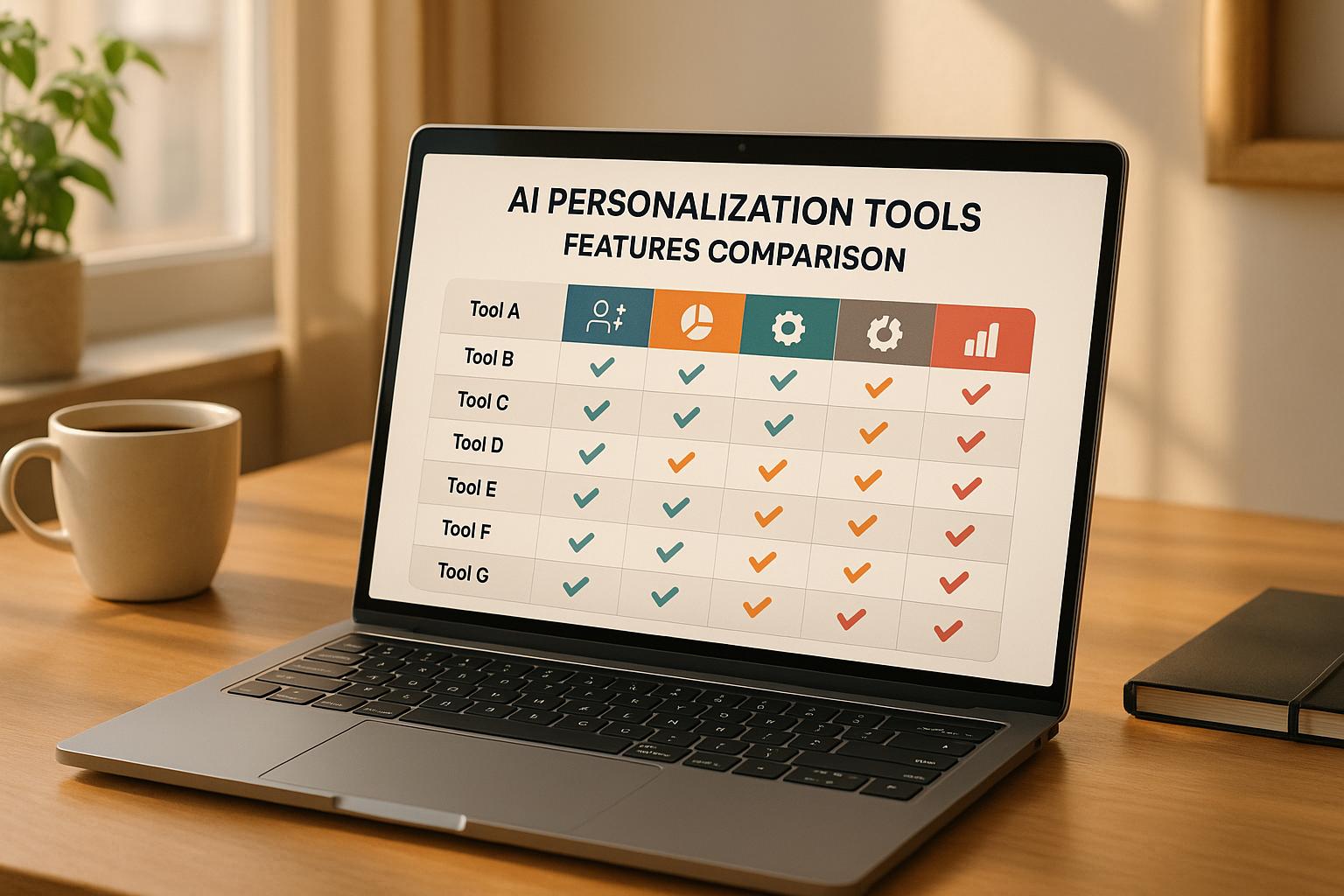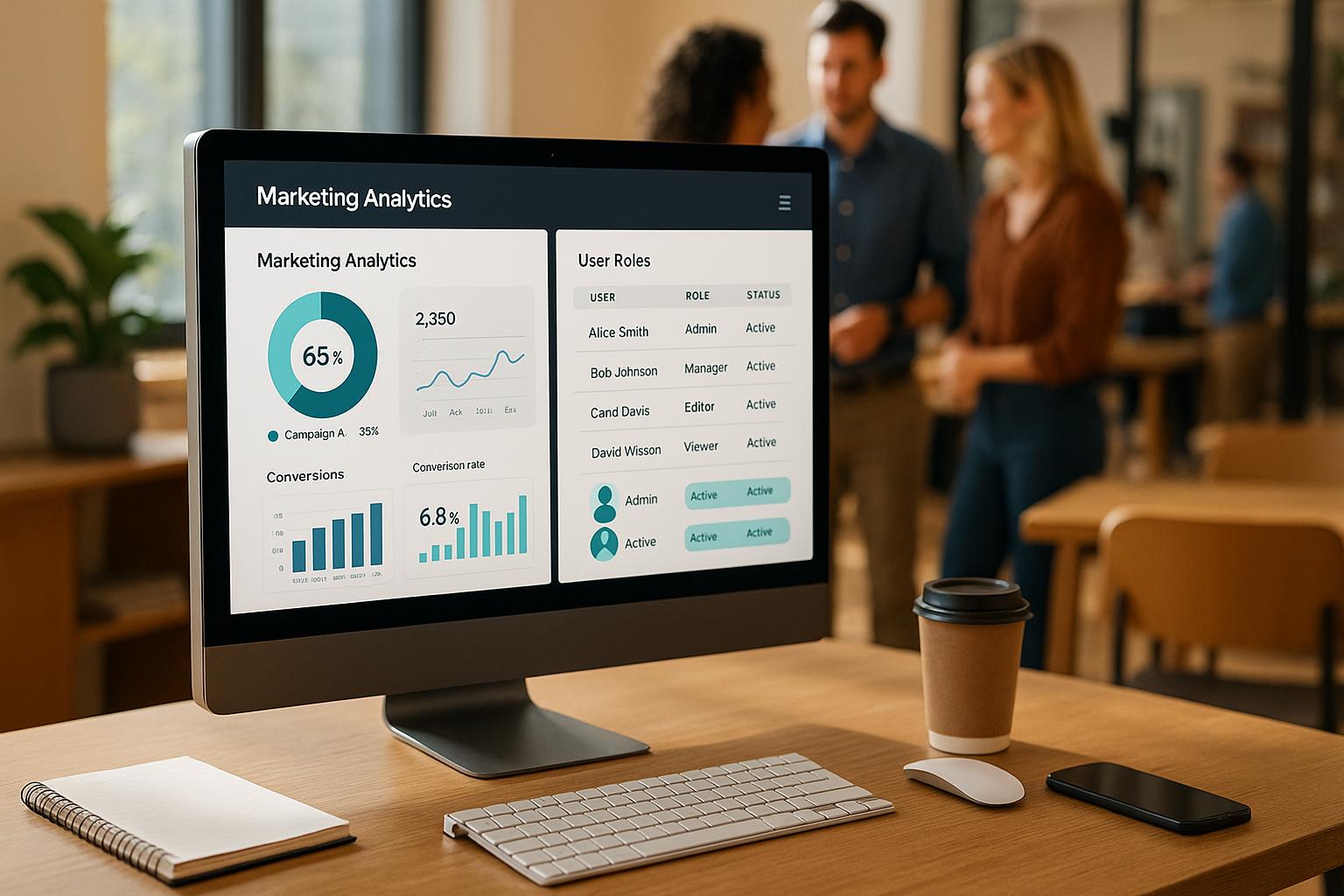Marketing teams face a common challenge in 2025: fragmented data across platforms. With ad spending exceeding $1 trillion last year and growing at 9.5% annually, integrating data is now a priority. Why? Data silos slow decision-making, reduce personalization, and cost businesses millions annually.
Here are five tools that help unify marketing data for better insights and efficiency:
- Adverity: Connects 600+ sources, offers near real-time data integration, and scales for businesses of all sizes.
- Domo: Features 1,000+ connectors, real-time insights, and a user-friendly interface ideal for enterprise needs.
- Contentsquare Data Connect: Streams behavioral data to platforms like Snowflake and BigQuery, simplifying user experience analysis.
- AWS AppSync: GraphQL-based, real-time synchronization tool for developers managing diverse data sources.
- Hevo Data: No-code platform with 150+ connectors, real-time pipelines, and flexible pricing starting at $239/month.
Quick Comparison:
| Tool | Connectors | Real-Time Integration | Ease of Setup | Starting Price | Best For |
|---|---|---|---|---|---|
| Adverity | 600+ | Yes | Moderate | Custom pricing | Marketing analytics |
| Domo | 1,000+ | Yes | User-friendly | Custom pricing | Enterprise BI solutions |
| Contentsquare | Limited | Yes | Simple | Custom pricing | User experience insights |
| AWS AppSync | GraphQL | Yes | Technical expertise | Usage-based | Developers managing complex systems |
| Hevo Data | 150+ | Yes | No-code | $239/month | Non-technical teams |
Key Takeaway: The right tool depends on your needs - whether it's scaling, ease of use, or advanced integration capabilities. By unifying your data, you can boost efficiency, improve decision-making, and meet growing consumer expectations for personalization.
Marketing Data Integration is Broken - Here’s How Teams Are Fixing It
1. Adverity

Adverity simplifies data collection and transformation, allowing marketers to dedicate more time to strategic analysis. A standout feature is its extensive library of connectors.
Number of Pre-built Connectors
Adverity connects users to over 600 data sources through its vast connector library. It integrates seamlessly with major online marketing and advertising platforms, including APIs, databases, and file-based systems. This includes connections to platforms like Google Ads, Facebook, LinkedIn, Twitter, email tools, analytics platforms, CRM systems, and e-commerce tools. With such broad coverage, marketers can easily pull data from nearly any digital channel without needing custom development.
Real-Time Integration Capabilities
The platform provides near real-time data extraction, ensuring marketing teams have timely insights at their fingertips. With continuously updated connectors, Adverity captures data frequently, enabling teams to make quick adjustments to campaigns based on the most current information available. This capability is invaluable for staying agile in fast-paced marketing environments.
Ease of Setup and Use
While Adverity offers robust support, users note that the initial setup can require some technical expertise. Stefan G., a Performance Marketing Consultant, shared:
"Setup in Adverity Insights isn't that easy. You'll need some time to setup your first client."
Pricing and Scalability
Adverity automates data workflows, improving efficiency while scaling effortlessly. Although pricing details aren't publicly disclosed, its ability to save time and resources is clear. For instance, Infobip saved over 400 business hours annually by automating its data integration with Adverity. The platform adapts well to businesses of all sizes, handling diverse data volumes and complexities. Users consistently highlight its ability to provide immediate, actionable insights, making it a reliable choice for both growing businesses and large enterprises.
2. Domo
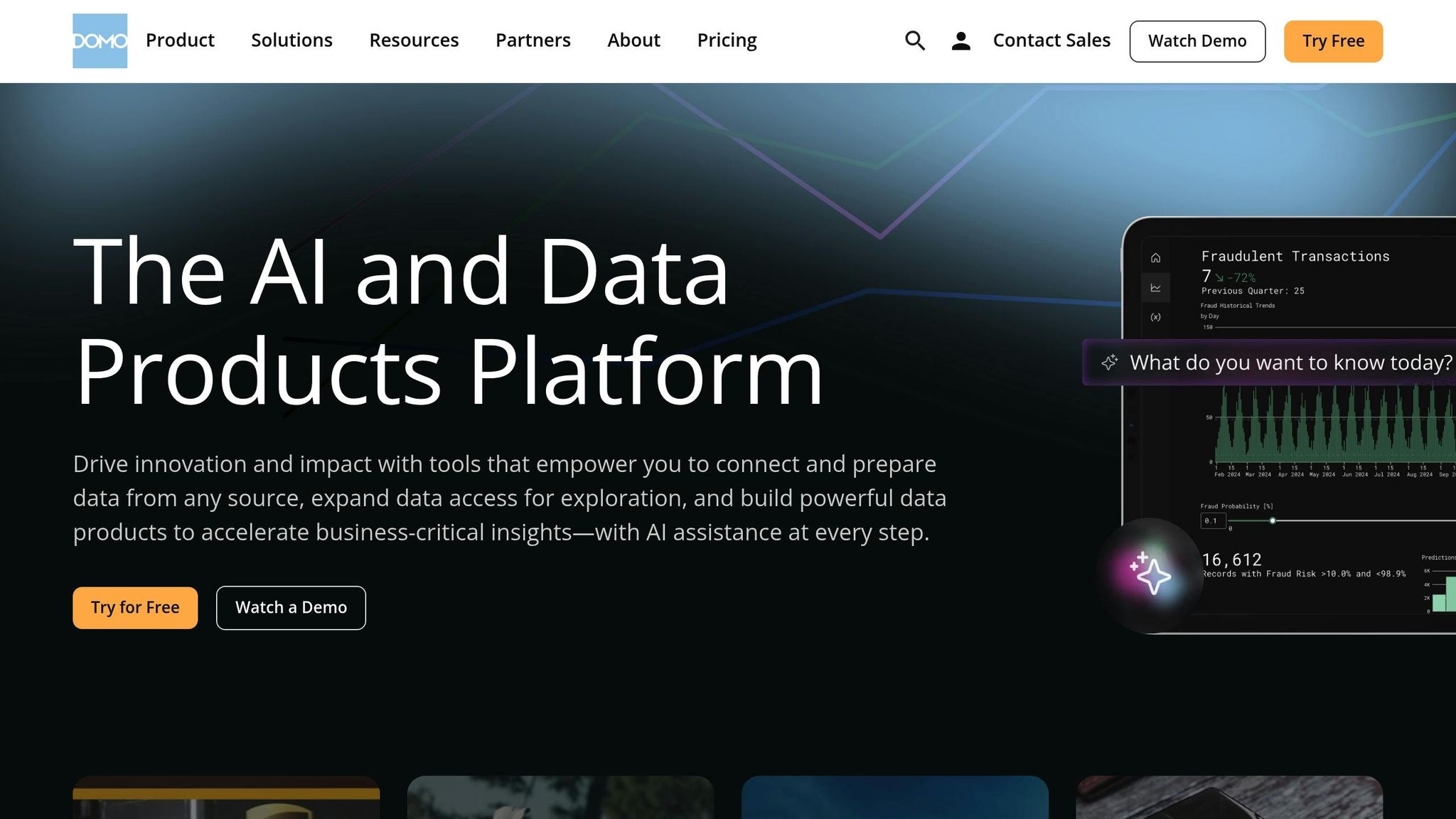
Domo brings together marketing data from a variety of sources, tackling the common issue of fragmented data with its powerful integration features. Impressively, 32% of Fortune 40 global companies rely on Domo, showcasing its ability to manage complex, enterprise-level data challenges.
Number of Pre-built Connectors
Domo boasts an extensive library of over 1,000 pre-built connectors, making it compatible with virtually any data source, whether cloud-based or on-premises. These connectors cover popular platforms like Salesforce, Google Sheets, BigQuery, MySQL, and even older legacy systems. Its user-friendly, open design allows for seamless integration of data from Excel files, FTP servers, flat files, and email attachments - no lengthy engineering projects required. One user shared that Domo connected to their legacy system in just four or five minutes. The platform also supports two-way data flow, ensuring smooth and continuous data exchange across all connections. This robust connector ecosystem forms the backbone of Domo’s real-time capabilities.
Real-Time Integration Capabilities
Domo delivers real-time data integration, ensuring businesses always have access to the latest information. This empowers teams to track key metrics and respond quickly to changing market conditions, improving agility across departments. By 2025, it's estimated that 90% of the world’s largest companies will use data streaming to improve their services and customer experiences. For instance, e-commerce businesses can take advantage of Domo’s real-time insights to create personalized discounts and promotions, driving higher engagement and conversion rates.
Ease of Setup and Use
Domo is designed with simplicity in mind, offering an intuitive drag-and-drop interface and pre-designed visualization templates. This reduces the need for IT involvement and makes the platform accessible to a wide range of users. It holds a solid Capterra rating of 4.3/5 from 325 reviews, with 76% of users praising its ease of use. One standout feature is Magic ETL, which allows users to build dashboards without needing SQL or coding skills. As one user explained:
"With Domo, one of the pieces we have is Magic ETL. In Magic ETL, you don't need to write code. You don't need to be a specialist in SQL or any database query language."
- reviewer1310631, Business Analyst at a tech services company
Pricing and Scalability
While Domo’s pricing details aren’t publicly available, the platform is designed to scale with enterprise needs. Users frequently highlight its ability to generate insights quickly and connect effortlessly to legacy systems. One reviewer shared their experience:
"I like the speed I can create new cards to better understand the data behind user complaints or potential areas to improve our system and customer experience. I also appreciate that it was easy to learn the software on the job with a limited background in data."
- Liam S., Real Time Center Senior Engineer at Medical Devices
Domo’s scalability and rich features make it a strong choice for growing businesses. By eliminating data silos and reducing the need for costly engineering efforts, it supports agile and informed decision-making.
3. Contentsquare Data Connect
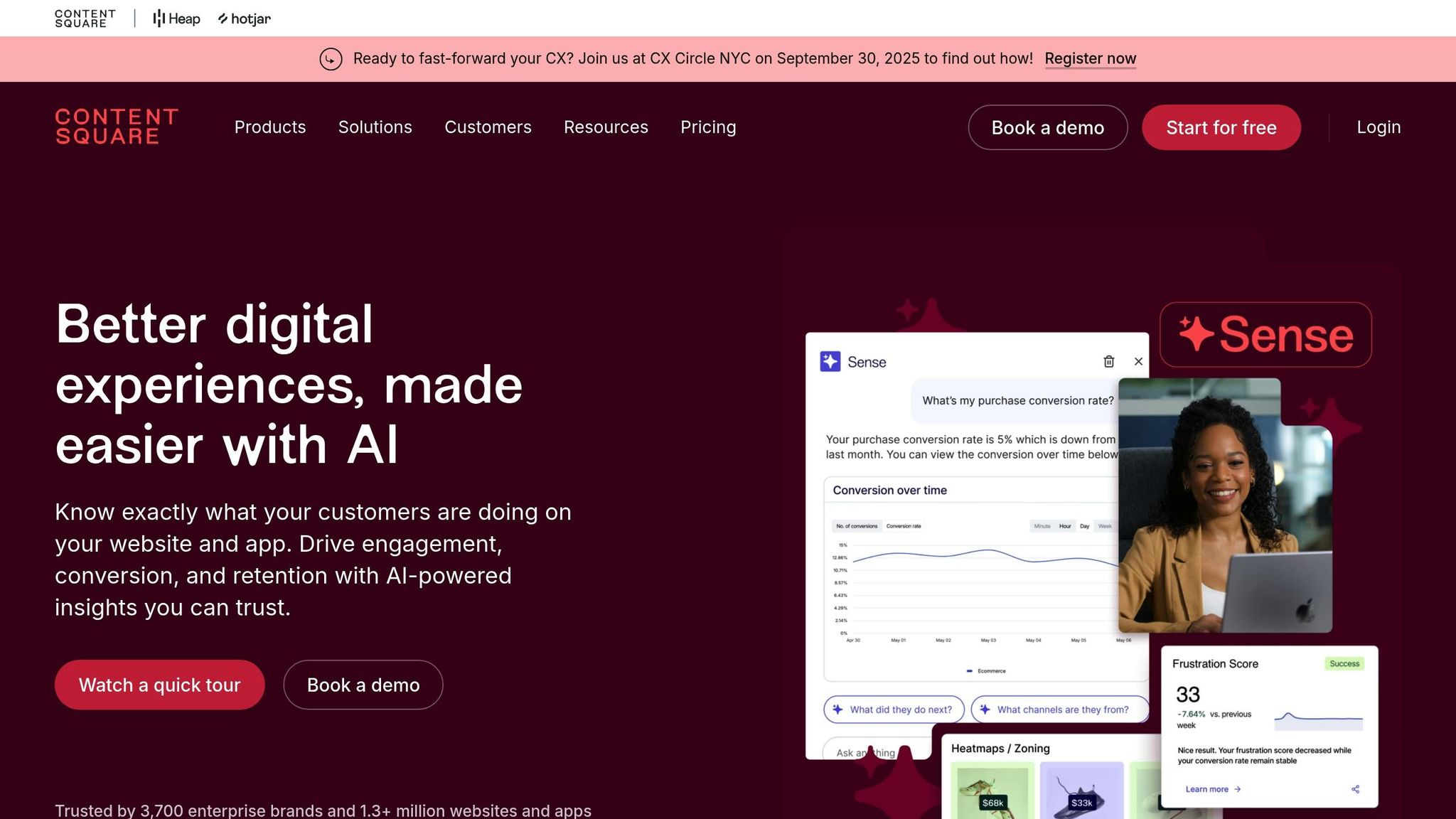
Contentsquare Data Connect brings behavioral data into the spotlight by integrating user experience insights directly with your existing data systems. According to a Contentsquare survey, 37% of teams spend 26–50% of their time verifying data. This tool simplifies that process by delivering clean, structured behavioral data straight to your data warehouse.
Number of Pre-Built Connectors
With a focus on quality, Contentsquare Data Connect offers seamless integration with top cloud data platforms like Snowflake, BigQuery, Databricks, Redshift, and Amazon S3. This targeted connectivity ensures that behavioral data - such as user interactions, performance metrics, and error tracking - flows effortlessly into your current data infrastructure. And the best part? It eliminates the need for custom development, enabling efficient and reliable real-time data transfers.
Real-Time Integration Capabilities
The tool streams experience, performance, and error data directly to the cloud. This real-time capability supports a wide range of marketing applications, from optimizing user journeys and personalizing experiences to predicting churn and executing retargeting campaigns. By providing AI-ready data without requiring custom APIs or manual processing, Contentsquare Data Connect proves especially useful for teams working on machine learning models and advanced analytics.
Ease of Setup and Use
Setting up Contentsquare Data Connect is refreshingly straightforward. With just one click, the platform streams essential data into your data warehouse. Whether you're exporting to BigQuery or Snowflake, the process requires minimal effort, making it accessible even for teams with limited technical expertise.
Pricing and Scalability
The platform structures raw data into ready-to-use datasets, cutting down the time and resources typically spent on data preparation. Its built-in data governance ensures that the information is well-organized and immediately queryable, eliminating the need for extensive cleanup. By simplifying these workflows, Contentsquare Data Connect allows marketing teams to build customized datasets with ease, breaking down data silos and offering a cost-efficient way to leverage behavioral data at scale. This streamlined approach makes it a powerful tool for organizations aiming to maximize the value of their data.
sbb-itb-5174ba0
4. AWS AppSync
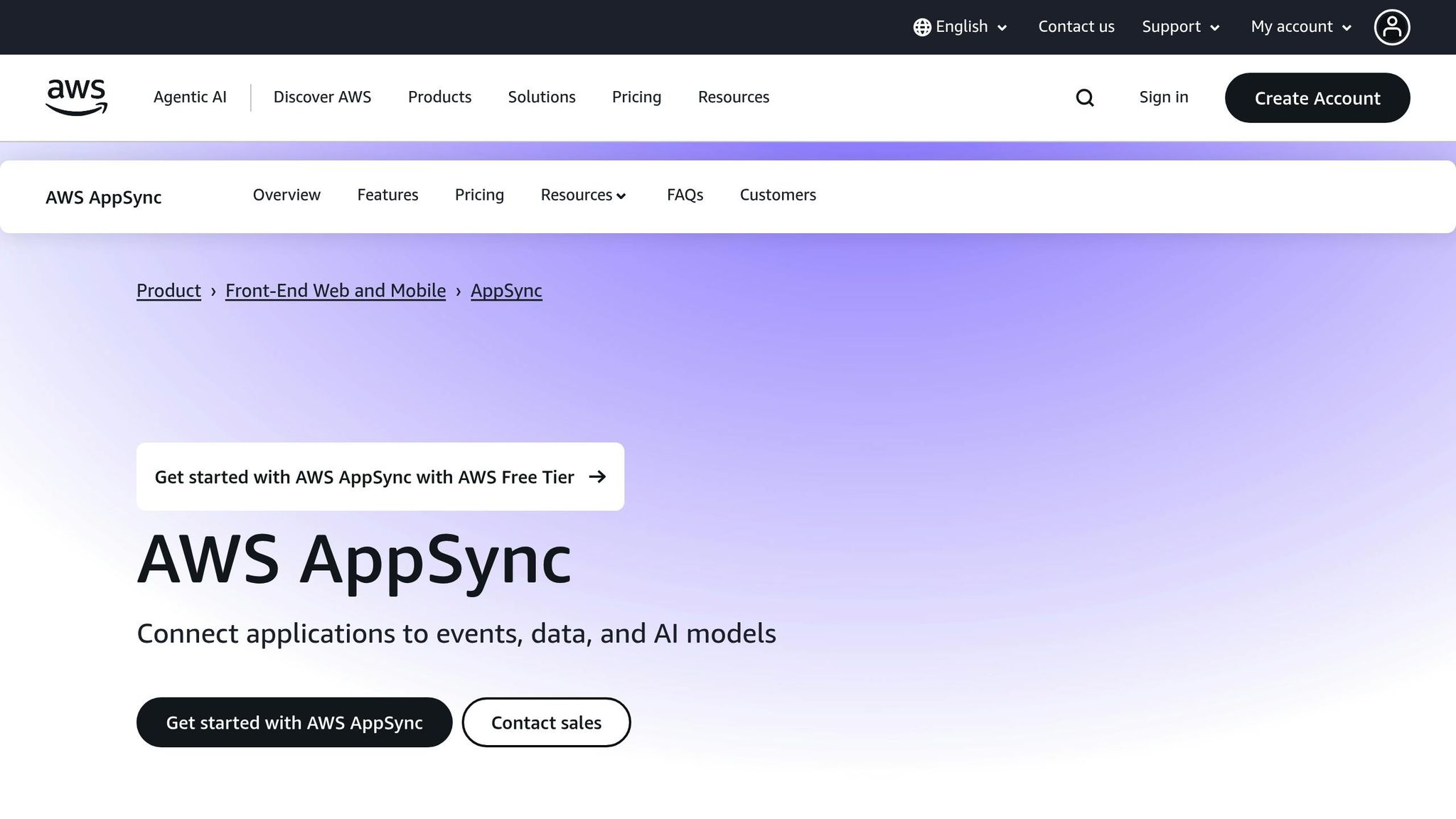
AWS AppSync is Amazon’s managed GraphQL service designed to simplify data integration across multiple platforms. Unlike traditional REST APIs, which often require multiple calls to gather data from various sources, AppSync enables marketing teams to fetch all the information they need with a single GraphQL query. This makes it an ideal choice for unifying data from diverse marketing channels, databases, and services.
"AWS AppSync simplifies that process by offering a managed GraphQL API service that unifies your data sources, supports live updates, and keeps everything in sync - even when users go offline."
Thanks to its GraphQL foundation, AppSync can reduce response payload sizes by up to 90% compared to REST APIs. For teams handling large datasets from advertising platforms, CRM systems, and analytics tools, this efficiency is a game-changer. Combined with its real-time synchronization features, AppSync ensures that fragmented marketing data becomes cohesive and actionable.
Real-Time Integration Capabilities
One of AppSync’s standout features is its ability to provide real-time data synchronization. Its subscription-based model supports live updates and push notifications, making it ideal for dashboards that require instant data refreshes. With tools like AppSync Events, marketing teams can connect AWS Lambda, DynamoDB, and Aurora to automate data transformation and validation.
"With this new update, developers can utilize a single WebSocket connection for both publishing and receiving events, which significantly reduces implementation complexity."
– Brice Pellé, Principal Product Manager at AWS
This single WebSocket connection approach enables features like live campaign performance tracking and instant lead notifications without requiring a complicated setup. By ensuring continuous synchronization across marketing channels, AppSync helps eliminate data silos. Plus, with a 99.95% uptime SLA, the platform ensures reliable data flow.
Ease of Setup and Use
Setting up AWS AppSync is straightforward. Through the AWS console, you can create an API, define a data schema, and connect your data sources. AWS Amplify further simplifies the process by offering full-stack deployment and automatically generating API documentation to clarify data integration.
"AWS AppSync has allowed us to realize the power of GraphQL without the burden of supporting any server related GraphQL instances."
– Bradley Harrison, Application Development Manager, American Commercial Barge Lines
With AppSync, teams can request exactly the data they need in a single query, whether it’s campaign metrics, customer details, or performance analytics. This precision not only saves time but also streamlines workflows.
Pricing and Scalability
AWS AppSync operates on a pay-as-you-go model, making it adaptable to varying data needs. The pricing includes $4.00 per million queries, $2.00 per million real-time messages, and $0.09 per GB of data transfer. For smaller teams, a free tier with limited usage is available. AppSync also supports up to 100,000 concurrent active subscriptions per AWS region, ensuring scalability as data demands increase.
"Using AWS AppSync as a GraphQL gateway has helped us reduce the number of server-side API calls made by our client code from a dozen to one or two. We were able to do this without having to maintain another API server, and we got this up and running with a week's-worth of engineering effort."
– Michael S. Manley, Chief Technology Officer, Public Good Software, Inc.
The platform’s automatic scaling adjusts seamlessly to fluctuating data loads, whether during quiet periods or high-traffic campaign launches. Built-in caching with a TTL of up to 24 hours enhances performance for frequently accessed metrics, while native batching support can improve efficiency by up to 30% for multi-operation requests.
5. Hevo Data
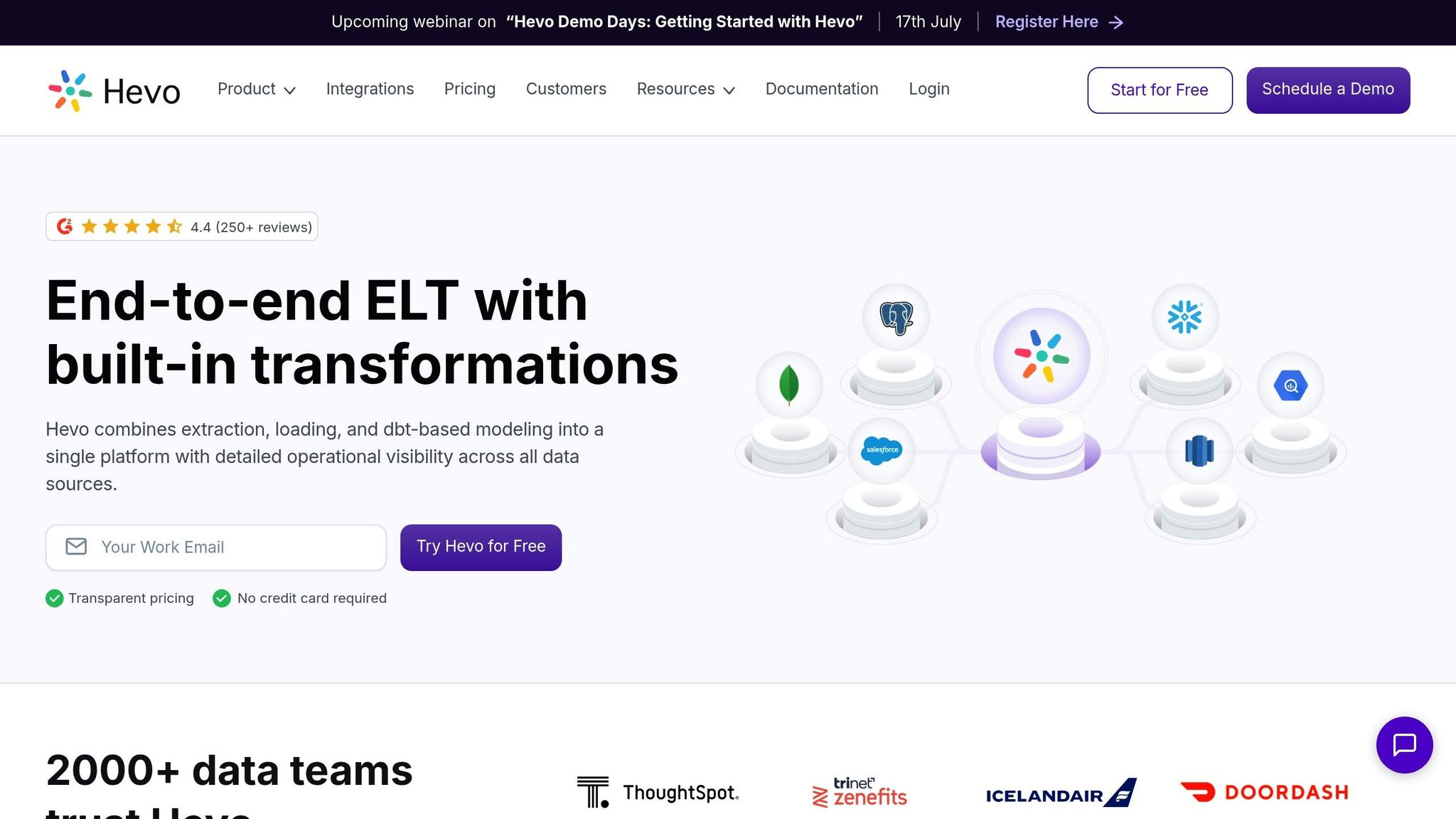
Hevo Data takes a no-code approach to data integration, making it an attractive option for teams looking to streamline their workflows. Used by over 2,000 data teams worldwide, this platform processes over 1 petabyte of data every month and handles 2.5 billion daily events. With a 4.3 out of 5-star rating on G2, Hevo has established itself as a reliable solution for managing large-scale data integration challenges.
Number of Pre-Built Connectors
Hevo Data boasts an impressive library of 150+ pre-built connectors that support a variety of marketing platforms, databases, and cloud services. These connectors make it easy for marketing teams to integrate data from tools like advertising platforms, CRM systems, analytics tools, and social media channels - without needing to write a single line of code.
For situations where a standard connector isn't available, Hevo offers flexibility. Users can either create their own connector using REST API or request a custom solution. This ensures even the most niche tools can be seamlessly added to your data pipeline.
Real-Time Integration Capabilities
One of Hevo's standout features is its real-time data synchronization. The platform automatically detects schema changes and adjusts to spikes in data volume without requiring manual intervention. This means your data pipelines stay reliable during high-demand periods, like a product launch or a seasonal campaign.
The automation built into Hevo has tangible benefits. Companies using the platform report saving over 40 developer hours per month, while data analytics teams have reduced the time spent on data preparation by 30%.
Ease of Setup and Use
Hevo's drag-and-drop interface simplifies the setup process, making it accessible for users of varying technical expertise. Features like automated schema detection and mapping minimize the need for developer involvement. Configuring data sources and warehouses can be done in just a few clicks, entirely code-free.
"Setting up a pipeline on Hevo is very easy. That's the main thing - you can just set it up, forget about it, and have your data automatically available in the warehouse." - Mattéo Faelli, Head of Internal Operations
The platform's intuitive design has earned widespread praise. Henry E., a Software Engineer, shared his experience:
"What I like best about Hevo Data is its intuitive user interface, clear documentation, and responsive technical support. The platform is straightforward to navigate, even for users who are new to data migration tools"
This user-friendly approach, combined with flexible pricing, makes Hevo a great option for teams of any size.
Pricing and Scalability
Hevo Data offers a free plan that provides access to over 50 data connectors, making it a practical choice for smaller teams or those exploring the platform. For more advanced needs, the Starter plan starts at $239/month, with custom pricing available for larger enterprises.
The platform is designed to scale automatically, adapting to growing data demands without the need for constant monitoring or manual adjustments. Alex Thomson, Head of Data Engineering & Analytics, highlighted its impact:
"Hevo has been a game-changer for us. The automation, ease of use, and seamless integration have dramatically improved our efficiency"
Hevo also includes robust error handling and alert features, along with a responsive support team to quickly resolve any issues. This combination of automation and hands-on support makes it a dependable choice for marketing teams needing a hassle-free data integration solution.
Tool Comparison Chart
When choosing the right tool for your needs, it's crucial to weigh factors like efficiency, cost, and usability. The table below outlines the main features of five leading tools, followed by a breakdown of their strengths to help you make an informed choice.
| Tool | Pre-Built Connectors | Real-Time Integration | Ease of Setup | Starting Price | Best For |
|---|---|---|---|---|---|
| Adverity | Large library | Yes | Moderately complex | Custom pricing | Marketing teams needing detailed analytics |
| Domo | Extensive connector library | Yes | User-friendly | Custom pricing | Teams seeking all-in-one business intelligence solutions |
| Contentsquare Data Connect | Limited set | Yes | Straightforward setup | Custom pricing | Optimizing digital experiences |
| AWS AppSync | GraphQL-based | Yes | Requires technical expertise | Usage-based | Developers building real-time applications |
| Hevo Data | 150+ pre-built connectors | Yes | No-code drag-and-drop | Free plan available; Starter at $239/month | Non-technical teams prioritizing simplicity |
Connector Volume and Variety
Each tool offers a different approach to connectors. Domo stands out with its extensive library, ideal for complex enterprise needs. Adverity focuses on marketing analytics, while Hevo Data provides 150+ connectors tailored to popular business use cases. Contentsquare Data Connect, on the other hand, offers a smaller, curated set designed for enhancing digital experiences.
Technical Requirements
Hevo Data's no-code interface is perfect for teams without technical expertise, making it easy to set up and use. AWS AppSync caters to developers, requiring more advanced skills to leverage its GraphQL-based capabilities. Domo and Adverity strike a middle ground, offering user-friendly interfaces with room for customization.
Cost Considerations
Pricing structures vary widely. Hevo Data offers a free plan and starts at $239/month for paid tiers, providing flexibility for smaller teams. AWS AppSync uses a usage-based pricing model, which can be ideal for scalable projects. Adverity, Domo, and Contentsquare Data Connect follow custom pricing models, allowing for tailored solutions based on specific needs.
Real-Time Processing
All tools support real-time integration, though the implementation may differ depending on the platform.
Scalability and Support
For enterprise-level scalability, Domo and Adverity are well-equipped, offering robust support for large deployments. Hevo Data, while designed for automatic scaling, is also known for its responsive customer support. AWS AppSync and Contentsquare Data Connect cater to more specific use cases but can scale effectively within their niches.
Choosing the right tool depends on your team's technical skills, budget, and the specific challenges you're aiming to address.
Conclusion
Marketing data integration has become a necessity. With businesses using only 12% of their data and 40% of projects failing due to challenges in merging and analyzing data sets, selecting the right integration tool is no longer just a technical choice - it’s a strategic decision that directly influences marketing success. This growing need is pushing companies to adopt tools that bring data together seamlessly.
Data silos lead to inefficiencies, inconsistent insights, and missed opportunities that can hurt your bottom line. The tools we’ve covered - Adverity, Domo, Contentsquare Data Connect, AWS AppSync, and Hevo Data - offer different ways to eliminate these barriers, creating unified data pipelines that support real-time processing and scalable analytics. Each tool has a distinct role in helping businesses achieve a cohesive data strategy.
Examples like Yamaha Motorsports and Bayer Crop Science highlight how effective integration can drive real-time insights and improve operational efficiency.
To get started, take a strategic approach. Evaluate your current data systems, pinpoint silos, and align your integration efforts with your business goals. It’s worth noting that 80% of business operations executives already view data integration as critical to their operations. With the market projected to grow at a 12.5% annual rate through 2032, the importance of integration is only increasing.
For further exploration, check out the Marketing Analytics Tools Directory to find solutions tailored to your needs.
Ultimately, a strong integration tool doesn’t just unify data - it speeds up decision-making and enhances the customer experience. By 2025, the real cost will be in failing to take action.
FAQs
What should I look for when selecting a marketing data integration tool in 2025?
When choosing a marketing data integration tool in 2025, there are several key factors to keep in mind to ensure smooth integration and long-term growth. Look for tools that offer:
- Compatibility with your current platforms and systems to avoid disruptions.
- Transparent pricing that aligns with your budget, without hidden fees.
- User-friendly design that works well for both tech-savvy users and those less experienced.
- Automation features to simplify and speed up repetitive tasks.
- Strong security measures that comply with data privacy laws.
It’s also important to select a tool that can scale alongside your business needs and supports reliable data governance to keep your information accurate and consistent. By focusing on these aspects, you’ll be better equipped to unify your marketing data and make smarter, data-driven decisions.
How does real-time data integration improve marketing strategies?
Real-time data integration transforms marketing strategies by providing current and precise insights, enabling businesses to make swift, well-informed decisions. This capability allows marketers to tweak campaigns on the fly, respond immediately to customer actions, and deliver highly tailored experiences.
By consolidating data from various platforms, it ensures smoother operations and guarantees that every team works with the same dependable information. The result? Improved customer experiences, more impactful campaigns, and stronger outcomes for your marketing initiatives.
What are the typical costs and pricing models for marketing data integration tools like Adverity and Hevo Data?
Adverity's pricing is tailored to match your specific needs. Typically, the starting cost is around $500 per month for access to core connectors, while full access to all connectors begins at approximately $2,000 per month. Their pricing structure is flexible, allowing adjustments based on your requirements.
Hevo Data follows a tiered pricing approach, where the cost varies depending on the number of records you process. Plans start at about $249 per month, and they offer a 14-day free trial so you can explore their services before committing. Both platforms provide options for monthly and annual payments, giving you the flexibility to choose what works best for your budget and objectives.
